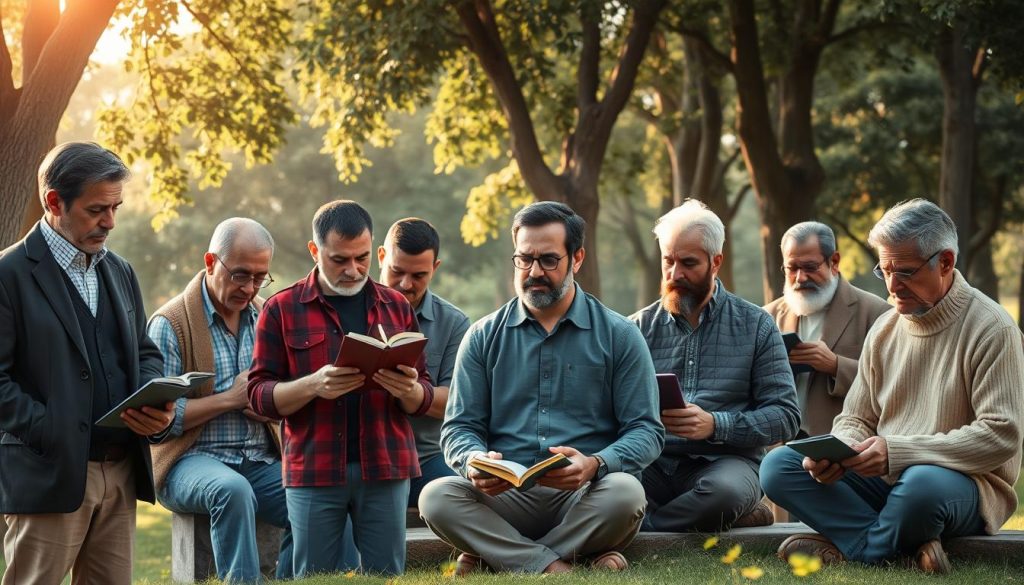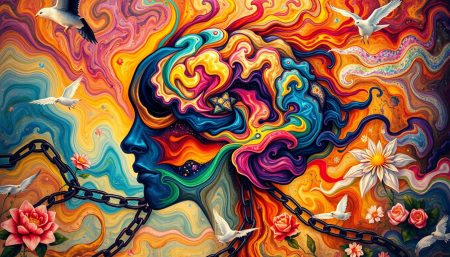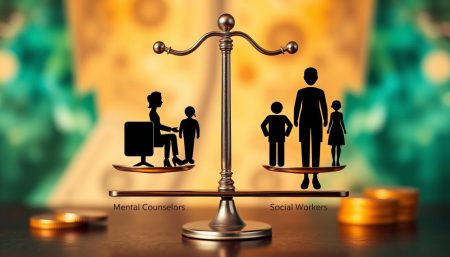Every year, we set aside a special time to focus on male mental health awareness. This is Men’s Mental Health Month. It’s a time to talk about the mental health issues men face and how we can help.
We aim to build mental resilience in men and break down the stigma that stops them from seeking help. This month is all about starting important conversations and making a change.
During Men’s Mental Health Month, we all come together to support men’s mental health. We share knowledge, resources, and stories. This helps us understand why this month is so important.
Key Takeaways
- Observation of Men’s Mental Health Month annually raises crucial awareness.
- Focuses on unique mental health challenges faced by men.
- Seeks to build mental resilience in men through support and dialogue.
- Crucial in addressing and breaking down stigma surrounding male mental health.
- Essential for spotlighting the need for accessible support and resources.
- Encourages open discussions and personal narratives to foster understanding.
Understanding Men’s Mental Health Month
Every year, Men’s Mental Health Month shines a light on the unique mental and emotional struggles men face. It’s a time to raise awareness and support for male mental health awareness. Knowing why and how this month started is key to helping men feel stronger and supported.
The Significance of an Awareness Month
Men’s Mental Health Month was created to tackle the stigma and lack of reporting around men’s mental health. It’s a chance to open up about mental health and support each other. By getting involved, we can change how society views mental health and help more men get the help they deserve.
Origins and History of the Observance
Started by mental health advocates, Men’s Mental Health Month has made mental health issues more visible. It began as a small movement but has grown, backed by health experts and organizations. Its goal is to build up masculine mental fortitude in communities everywhere.
| Year Established | 2011 |
|---|---|
| Initial Focus | Depression and Anxiety |
| Current Objectives | Expanding Awareness, Reducing Stigma, Encouraging Support Seeking Behavior |
The Importance of Male Mental Health Awareness
Male mental health awareness is a critical issue that needs more attention. For a long time, men’s mental wellness has been shrouded in stigma. This has made it hard for men to open up about their mental health.
Confronting Stigmas Around Male Mental Health
Stigma is a big barrier for men seeking mental wellness. The idea of being tough and not showing weakness has been deeply ingrained. Confronting stigma means changing these outdated views and building a new understanding of masculinity.
Why Male Mental Health Often Goes Unaddressed
There’s a big gap in health services for men because of lack of awareness. This gap comes from stereotypes and not enough programs focused on male mental health awareness. Men often don’t report their symptoms, making it hard for healthcare to help them.
Making men’s mental wellness more visible is crucial for society. It’s not just about healthcare; it’s about changing how we see men’s mental health. The table below shows how our views differ from what research shows.
| Social Perception | Clinical Reality |
|---|---|
| Men do not suffer from depression as women do | Depression rates are comparably high among men but often go unrecognized |
| Men should not need help for stress or anxiety | Stress and anxiety are common among men and require appropriate interventions |
| Mental health struggles are a sign of weakness | Mental health struggles are a medical issue that can affect anyone, irrespective of strength |
By understanding the gap between what we think and what research shows, we can improve male mental health awareness. This will help break down the stigmas that stop men from getting the help they need.
Recognizing Symptoms of Mental Health Issues in Men
It’s important to recognize symptoms of mental health problems in men early. Symptoms can show up in many ways, making it hard to spot and treat them. Look out for mood swings, lasting sadness, and too much worry or guilt.
Men might pull away from friends and activities, feel very tired, or have trouble sleeping. These signs are often missed because society expects men to be tough and independent. It’s key to encourage men to find male depression resources and male anxiety assistance.
Talking openly about mental health helps. It shows that these signs don’t mean someone is weak. Instead, they need to check their health. For more help, visit sites like this one on Men’s Mental Health Awareness.
- Irritability or unnecessary anger
- Difficulty concentrating
- Reduced interest in favorite activities
- Increased muscle tension
- Feelings of emptiness or hopelessness
Spotting these signs and getting help can change a man’s life. It makes it okay to talk about feelings and seek help. Getting a professional evaluation can help someone get back on the path to well-being.
When Is Men’s Mental Health Month
Knowing when is Men’s Mental Health Month is key for starting important talks and actions around male mental health awareness. Every November, this month highlights the big mental health issues men face worldwide. It aims to create a space where men feel safe to talk about their mental health.

This month is a big chance for groups and health experts to spread the word and fight the stigma around men’s mental health. By picking November, male mental health awareness efforts can team up with other health events. This combo can really help build community support and understanding.
| Focus Area | Objectives | Key Activities |
|---|---|---|
| Education | Disseminate information | Workshops, Seminars |
| Support | Mobilize community support | Counseling Sessions, Hotline Promotion |
| Engagement | Increase public participation | Awareness Campaigns, Public Speaking Events |
Men’s Mental Health Month is more than just raising awareness. It shows how important it is for everyone to get involved. Knowing when is Men’s Mental Health Month lets groups and people plan better to make a big difference. November is the perfect time for events, learning campaigns, and talks that focus on men’s mental health.
Events and Activities During Men’s Mental Health Month
Men’s Mental Health Month brings a variety of events and activities. These aim to boost mental fitness for men and highlight key male depression resources and male psychology support. From local meetups to online campaigns, each event plays a big role in raising awareness and improving mental health among men.
Community Events and Public Speaking
Community centers, healthcare places, and local groups often host events. These include public talks, workshops, and panels with mental health experts. The goal is to teach people about the need for mental health care among men and offer real help.
These events help build a community effort to tackle male mental health problems. They encourage men to talk openly about their feelings and seek help.
Online Campaigns and Social Media
Online campaigns are key in spreading the word about mental health support. Social media platforms offer live talks, posts, and chats. This lets people connect and get help right away.
Groups share content that shows the importance of male depression resources and support. This is vital for keeping mental fitness for men strong.
| Type of Activity | Description | Objective |
|---|---|---|
| Public Speaking Events | Workshops and seminars hosted by experts discussing mental health challenges and solutions. | To inform and equip men with the strategies and support mechanisms for improving mental health. |
| Online Interactive Sessions | Utilizing social media for live discussions, Q&As, and sharing stories. | To reach a wider audience and provide real-time engagement and support. |
How to Support Men’s Mental Health Month
Every year, many efforts focus on boosting male mental health awareness. They highlight the need for mental resilience in men and encourage support. Here are some practical ways to get involved and make a difference.
Participating in Awareness Campaigns
Raising awareness is key to breaking down stigmas around male mental health. By joining or starting awareness campaigns, you can share important info. This helps make mental health talks more common among men. Campaigns can include social media posts, public talks, or webinars.
Volunteering and Advocacy Opportunities
Volunteering with groups focused on male mental health is rewarding and needed. It also helps push for mental health support at all levels. Advocacy plays a big role in making these efforts known.
| Activity | Impact |
|---|---|
| Volunteering at local mental health charities | Direct support to men needing mental health services and awareness |
| Organizing workshops on mental resilience in men | Education and skill-building for individual and community resilience |
| Lobbying for policies supporting male mental health | Influencing positive changes in public health policies |

Men’s Mental Wellness and Societal Roles
The way men’s mental wellness and societal roles interact deeply affects men’s mental health today. Societal norms shape what it means to be a man. It’s crucial to understand how these norms impact mental health.
Traditional roles push for masculine mental fortitude, focusing on strength and self-reliance. While these qualities are good, they can also make it hard for men to share their emotional struggles. This can hurt men’s mental wellness.
To improve mental health, there’s a push to change these roles. Advocates want to make them more open to vulnerability and talking openly.
| Impact of Societal Expectations | Proposed Changes |
|---|---|
| Pressure to adhere to traditional masculine attributes | Encouraging emotional openness and vulnerability in men |
| Stigma around discussing mental health issues | Normalizing mental health conversations in male-dominated spaces |
| Limited social support for mental wellness | Creating support networks focused on men’s mental health |
By questioning these societal roles and making a safe space for men to talk about their mental health, we can build stronger men. This is done through being resilient and open, not through silence.
Mental Fitness for Men: Building Resilience
Building mental fitness for men means taking steps to be mentally strong. It’s about being mindful, staying active, and connecting with others. These habits help men stay mentally healthy.
Practices to Cultivate Mental Resilience
Mindfulness, like meditation and yoga, is key for mental strength. It helps you stay in the moment and lowers stress. Exercise also boosts mood and fights depression by releasing happy hormones.
Tools for Developing Masculine Mental Fortitude
Having a strong support network is vital for mental toughness. Friends, family, and community help men talk openly about mental health. Learning about mental fitness through workshops also helps manage stress and keep mental health in check.

- Meditation and mindfulness sessions – Helps in reducing stress and enhancing concentration.
- Regular exercise routines – Supports emotional health by improving self-esteem and cognitive function.
- Developing strong social connections – Essential for emotional support and reducing the stigma associated with discussing mental health issues.
Male Depression Resources and Support
In today’s world, male depression resources and male mental health awareness are key. Men’s Mental Health Month helps highlight these efforts. It shows how far we’ve come in helping men get the help they need.
Organizations Dedicated to Male Mental Health
Groups worldwide focus on improving male mental health. They offer support that fits men’s unique needs. Services range from crisis help to long-term therapy, all designed for men’s emotional and mental health.
Accessing Professional Help and Counseling
Getting help is the first step towards healing. Counseling for men tackles issues like depression and anxiety. It creates a safe space for men to talk openly and feel emotionally supported.
| Service | Description | BENEFITS |
|---|---|---|
| Crisis Help Lines | Immediate assistance and guidance through phone or chat. | Immediate accessibility and anonymity |
| Therapeutic Counseling | Professional counseling targeting specific mental health needs. | Personalized support and coping strategies |
| Support Groups | Peer support environments for sharing and healing. | Community connection and shared experiences |
| Online Resources | Articles, tools, and contacts for self-help and education. | Easy access and a wealth of information |
Understanding Male Psychology Support Needs
Men face unique psychological challenges that need to be understood. Cultural expectations and traditional gender roles play a big role in male mental health awareness. This makes specialized support crucial.

Men’s psychological support needs vary across different life stages. Young adults deal with identity and career pressures. Older men face life transitions and health issues. This shows the wide range of support needed for men.
- Early career pressures and relationship dynamics
- Middle age crises and parental responsibilities
- Retirement and the quest for meaningful engagement post-career
Each life scenario requires tailored psychological support. It must be adaptable and sensitive to men’s specific needs at each stage.
| Age Group | Common Psychological Needs | Support Strategies |
|---|---|---|
| 20-30 | Career guidance, relationship management | Professional counseling, mentorship programs |
| 31-50 | Crisis management, work-life balance | Stress relief workshops, family counseling |
| 51+ | Health management, social connection | Community groups, holistic health centers |
To improve male mental health awareness, we must recognize and meet the need for tailored support. By understanding and addressing the complex needs of male psychology, we can support men through all life stages.
Male Anxiety Assistance and Coping Mechanisms
Anxiety can be tough for men, often because of what others expect and their own stress. It’s key to talk about this openly and find ways to cope. Men’s Mental Health Month brings attention to this, stressing the need for professional help and support groups.
Coping Strategies for Anxiety
Learning and using coping strategies can really help with anxiety. Some effective ways include:
- Regular physical activity, which helps in reducing stress levels and improving overall mood.
- Structured routine, offering a sense of control and predictability.
- Mindfulness and meditation techniques, aiding in managing thoughts and emotions.
- Journaling, which can provide an outlet for expressing feelings and tracking progress.
Professional and Peer-Led Support Groups
Support groups are crucial for men dealing with anxiety. They offer a safe space to share feelings and experiences. Professional help, like therapy, is also key. It’s tailored to each person’s needs, helping them find lasting ways to cope.
As we move forward, talking more about men’s mental health is important. It shows we need specific coping strategies and support from our communities. This helps not just individuals but also changes how society views mental health.
Empowering Men to Speak Out About Mental Health
During Men’s Mental Health Month, it’s key to empower men to talk about their mental health. By breaking the silence around this topic, we create a supportive space. This space encourages healing and understanding.
Breaking the Silence Around Male Mental Health
The silence around male mental health is harmful and widespread. Efforts to break the silence aim to change the old ways of thinking. They help men feel safe to seek help without fear of being judged.
This change can lead to better mental health care for men. It means getting help sooner and managing mental health issues more effectively.

Influential Figures and Their Impact on Male Mental Health Conversations
Influential figures in mental health are crucial in changing how we see male mental health. They use their platforms to share personal stories and important information. They also push for mental health resources that meet men’s needs.
By doing this, they help make mental health discussions more common. This makes it easier for people to talk about their struggles in their communities.
Male Psychological Well-Being and Emotional Expression
Understanding male psychological well-being is key to a society that talks openly about mental health. It’s important to see the value of emotional expression in men. This is often hidden because of what society expects.
Being able to share feelings openly is linked to better mental health in men. During Men’s Mental Health Month, efforts focus on letting men share their feelings without fear. This is crucial for raising male mental health awareness and reducing the stigma around men’s mental health.
Studies show a strong connection between emotional expression and male psychological well-being. They find that men who share their feelings are less likely to struggle with depression and anxiety.
- Promoting environments where emotional health is valued and nurtured.
- Encouraging men to join support groups where they can share freely.
- Using campaigns to teach the public about the role of emotional expression in mental health.
Improving male mental health awareness starts with changing how we see emotional expression. This change can deeply affect not just men but their families and communities too.
Conclusion
Every journey towards healing and understanding has important final steps. Men’s Mental Health Month is more than a reminder; it’s a call for society to change how it views male mental wellness. It encourages us to support and talk about male mental health awareness all year, not just in one month.
This month starts important talks, helping men share their emotional struggles. It builds community support and better resources for mental health.
Men’s Mental Health Month shows how important men’s mental health is to society. It teaches us about resilience, support, and mental fitness. Knowing when is men’s mental health month helps us join forces for health equality for everyone.
As we wrap up this discussion, let’s remember the big picture of wellness. It’s also key to stay alert about other health issues. For example, knowing the early signs of colon cancer is crucial for overall health awareness.
In short, Men’s Mental Health Month brings hope and light. It guides men towards mental wellness and success.
FAQ
Q: When is Men’s Mental Health Month?
A: Men’s Mental Health Month is celebrated every November.
Q: Why is an awareness month for male mental health significant?
A: It’s important because it helps break down mental health stigmas for men. It makes it okay to ask for help. It also sheds light on the challenges men face, leading to better support.
Q: What are common stigmas around male mental health that need to be confronted?
A: Stigmas include thinking men can’t show weakness or ask for help. They think it’s a sign of weakness. These ideas stop men from talking about their mental health.
Q: How can symptoms of mental health issues in men be recognized?
A: Look for signs like irritability, withdrawal, mood changes, and stress. Also, watch for changes in sleep and eating habits. Spotting these signs early can help get the right support.
Q: What type of events and activities are organized during Men’s Mental Health Month?
A: There are community events, workshops, and online campaigns. These focus on mental strength and resources for men.
Q: How can one support Men’s Mental Health Month?
A: You can help by joining awareness campaigns and volunteering. Supporting mental health organizations and advocacy efforts is also key.
Q: How do societal roles affect men’s mental wellness?
A: Societal expectations can cause stress and pressure. They make men hide their feelings and avoid seeking help.
Q: What are some practices to cultivate mental resilience for men?
A: Regular exercise, mindfulness, and social connections are good. Creative pursuits and professional help when needed also help build mental strength.
Q: Where can men find resources and support for depression?
A: Men can find help through mental health groups, helplines, and online forums. Professional counseling services are also available. These resources are often highlighted in November.
Q: How are the specific psychology support needs of men addressed?
A: Men’s unique experiences are understood and support services are tailored. This includes addressing societal masculinity norms and expectations.
Q: How can men manage and receive assistance for anxiety?
A: Men can fight anxiety with healthy habits like exercise and relaxation. Seeking help from therapists or support groups is also crucial.
Q: What impact do influential figures have on male mental health conversations?
A: Famous people can greatly influence by sharing their stories. They encourage open talks and help break stigmas. This inspires more men to seek help.
Q: Why is emotional expression important for male psychological well-being?
A: It’s vital for processing and sharing feelings. This reduces stress and prevents mental health problems.

















